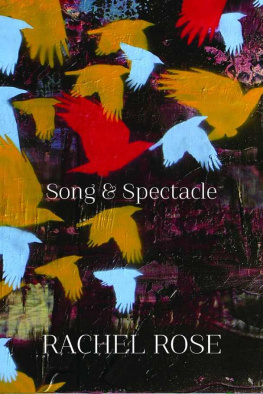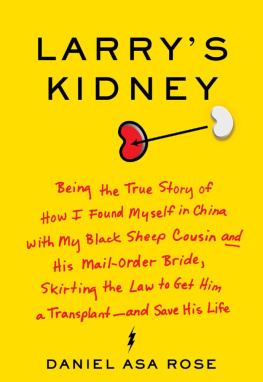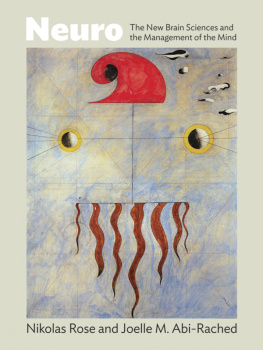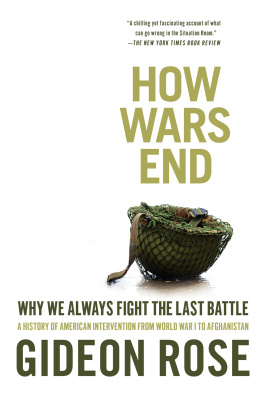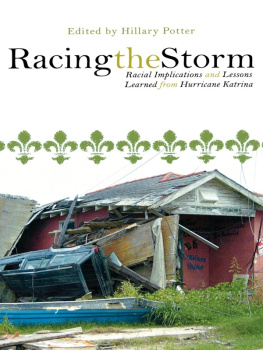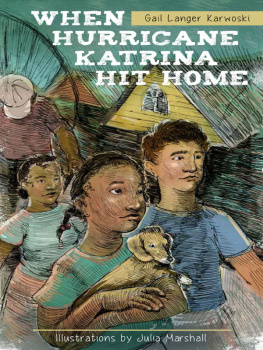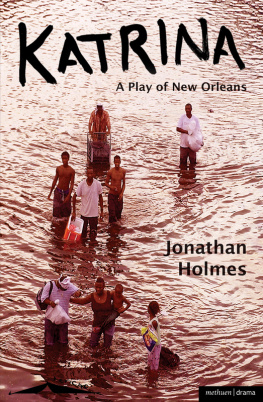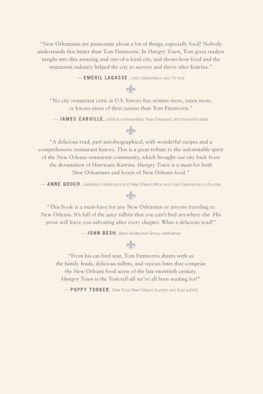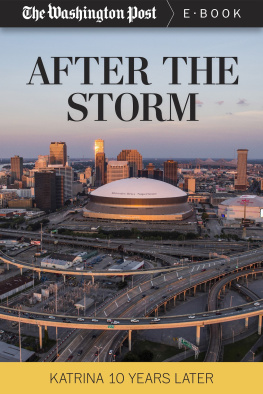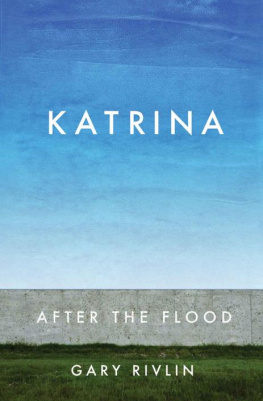Thank you for downloading this Simon & Schuster eBook.
Join our mailing list and get updates on new releases, deals, bonus content and other great books from Simon & Schuster.
C LICK H ERE T O S IGN U P
or visit us online to sign up at
eBookNews.SimonandSchuster.com
Contents
This book is dedicated to Thomas Coleman, a retired longshoreman, who died in his attic at 2214 St. Roch Avenue in New Orleans 8th Ward on or about August 29, 2005. He had a can of juice and a bedspread at his side when the waters rose.
There were more than a thousand like him.
TEN YEARS LATER
A Foreword by Chris Rose
Hard to believe its been ten years.
Sometimes it seems like a million years ago, sometimes like it was yesterday. But it never seems like it didnt happen.
Even ten years afterwith so much rebuilt, restored, resettled, reconfigured, and entirely reimaginedthe specter of Katrina still colors life here, in some small way, even if just a muted gray.
In casual conversations or social settings, it comes up. Might take a while, but it will come up eventually.
Thats not to suggest that the stranger sitting next to you is ready to collapse into a fit of despair, rail against the injustice, and then itemize everything he lost.
Its not like that anymore, thank God.
It was for a really long time, though.
And that time sucked.
Looking back, the hardest thing to wrap your head around is remembering how many people said: Let it go. Let New Orleans wash into the sea.
This was not just the discontented grumblings from Americas online lunatic fringe, but from established members of the media, the clergy, and Congress, most of whom made such vulgar pronouncements far away from the stink, the misery, and the wreckage.
The prevailing sentiment among such folks was that New Orleansbless her charming, offbeat little powdered-sugar heartwas not worth fixing.
Because not just the levees needed fixing. The roads needed fixing, the parks needed fixing, the schools needed fixing.
The jails, which needed fixing, were being jammed by the judiciary, which needed fixing. They were stressed to the breaking point handling the massive caseloads delivered by the NOPD, which needed a lot of fixing, and who were not fit or equipped to handle this citys crime situationwhich needed the most fixing of all.
You wonder: How could anyone have thought New Orleans was broken beyond repair?
(That was sarcasm.)
I acknowledge, looking back now from this side of the rubble and the floodlooking back from this side of historythat even a conservative estimate of the projected cost of rebuilding this city, coupled with the dubious integrity and doubtful competence of City Hall at the time... it was not a sure bet.
But still: Let New Orleans die?
When destiny calls you home, when its time to exit the stage, when your number is called (insert any other number of overused clichs for dying): Theres not a damn thing you can do about it. Money and politics cant fix dead.
But we werent dead. Or if we were, we didnt know it.
Here, in arguably the most death-obsessed city in the world, the natives are by turns unaware, unconcerned, and often unconvinced of our own mortality.
And whereas our geographical positioning might have seemed like a great idea at the timesay, 1718its now a challenge, perhaps even a risk.
And its true, we are neither the most logical nor efficient municipality in this great land.
But still.
Were also not the most educated folks youll ever meet, but one thing we did know: We were not going gently into that good night. We were not giving up on New Orleans.
And with the help of 500,000 of our closest friends around the countryor hell, maybe a millionwe put on some boots, pulled on some gloves, and got busy.
If what the magazines and websites have been sayingif what the analysts and futurists are predictingis true, then New Orleans is the destination for Americas next generation of young artists, entrepreneurs, and designers. Millennials, dreamers, and visionaries are here creating the next new business model, designing the next great app, fusing the next landmark technology, mixing the next banging cocktail.
Were the new Austin. The new Portland. The new Brooklyn. Hollywood South. Hipster City, USA. The New New Orleans, the bright new shining city on the hill. Except, well, without the hill.
We dont have any hills.
But you get the point.
And maybe thats all a load of piffle, I dont know. I reckon time will tell.
But I do know this: The more New Orleans changes, the more she remains the same. That is the nature of a place where irony is a birthright and contradiction is the dominant hand of fate.
Its hard to envision the day when the Thinking Class outnumbers the Drinking Class in this city, but we are approaching a necessary equilibrium between the old and new, the practical and the frivolous, the digital and the sensual.
We are innovation and tradition, high-tech and antique, fiber optics and gas lamps, new urbanism and the Vieux Carr, Uber cabs and streetcar lines, Airbnb and the Hotel Monteleone.
Were Dixieland jazz and sissy bounce.
New Orleans is today, as it was before, a place suspended between the physical world and the realm of imagination. The experience of everyday life here is magnified by emotional intensity and creative reverie, yet also reduced by the heat, humidity, and altitude to its most basic and primal elements: Food, shelter, and the Saints.
You can regulate our smoking and regulate our music andhard to believe this day has comeyou can even regulate our go-cups.
But you cannot regulate soul. You cannot legislate funk. And you cannot pass an ordinance that makes us ordinary.
The best things about us will never change.
And one final word: Thank you, America. Thank you, from me and my cityyou 500,000 (or hell, maybe a million) of our closest friendswho came down here over the past ten years and helped us rebuild this crazy, shambling, loveable hot mess of a city.
Because without New Orleans, where would all the Wild Things go in the night?
Theres a bunch of old nicknames for this city and a whole bunch more now, but taking stock of this past decade of transformationfrom our despair to our triumph, from our shame to our redemptionI know where I live now.
Welcome to Lucky Town.
June 2015
If there was no New Orleans, America would just be a bunch of free people dying of boredom.
J UDY D ECK
Introduction
Writing an introduction for a book like this is tricky business.
Intros I have read over the years are generally composed of personal anecdotes and references to the body of work that follows. But, in this case, what follows is the personal work, the veil pulled away, the soul of a cityand a writerlaid bare.
Newspaper reporters are used to covering death and disasterits our bread and butterbut nothing prepares you to do it in your own town. Usually, we parachute into trouble, fill our notebooks, and then hightail it back to the comfort of our homes and offices.
Katrina changed all that.
Our comfort zones disappeared, turned into rubble, wastelands, and ghost towns. I went from being a detached entertainment columnist to a soldier on the front line of a battle to save a city, a culture, a newspaper, my job, my home.
Whether we won or lost the war remains to be seen. New Orleans is still a work in progress. The observations, lamentations, and ruminations that follow are the story so far, as it unfolded to me in the first sixteen months after the flood.
Next page


